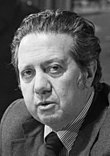| |||||||||||||||||||||||||||||||||||||||||||||||||||||||||||||||||||||||||||||
250 seats to the Portuguese Constituent Assembly 125 seats needed for a majority | |||||||||||||||||||||||||||||||||||||||||||||||||||||||||||||||||||||||||||||
|---|---|---|---|---|---|---|---|---|---|---|---|---|---|---|---|---|---|---|---|---|---|---|---|---|---|---|---|---|---|---|---|---|---|---|---|---|---|---|---|---|---|---|---|---|---|---|---|---|---|---|---|---|---|---|---|---|---|---|---|---|---|---|---|---|---|---|---|---|---|---|---|---|---|---|---|---|---|
| Registered | 6,231,372 | ||||||||||||||||||||||||||||||||||||||||||||||||||||||||||||||||||||||||||||
| Turnout | 5,711,829 (91.7%) | ||||||||||||||||||||||||||||||||||||||||||||||||||||||||||||||||||||||||||||
| |||||||||||||||||||||||||||||||||||||||||||||||||||||||||||||||||||||||||||||
Constituent Assembly elections were carried out in Portugal on 25 April 1975, exactly one year after the Carnation Revolution. The election elected all 250 members of the Portuguese Constituent Assembly.
It was the first free election held in Portugal since 1925, and only the seventh free election in all of Portuguese history. It was also the first under universal suffrage since 1894. Turnout was a record 91.66 percent, which remains (as of 2022) the highest ever in any Portuguese democratic elections (general, regional, local or European).
The main aim of the election was the election of a Constituent Assembly, in order to write a new constitution to replace the Estado Novo regime's authoritarian Constitution of 1933 and so this freely-elected parliament had a single-year mandate and no government was based on parliamentary support; the country continued to be governed by a military-civilian provisional administration during the deliberations of the Constituent Assembly.
With few or no opinion polls during the campaign, the real trend of the electorate was unknown, but incumbent Prime Minister Vasco Gonçalves was confident in a victory of the most leftwing forces in Portugal, forecasting that the Portuguese Democratic Movement (MDP/CDE) would win the election, followed by the Communists (PCP) and then the Socialist Party (PS).[1] In the end, this forecast was totally wrong.
The election was won by the Socialist Party with almost 38 percent of the votes and 116 seats. The Social Democratic Party (then known as the Democratic People's Party, PPD) was the second-most voted party, 26.4 percent and 81 seats, defending a project that it would soon abandon, social democratic centrism, the Portuguese "Social-Democracy", and becoming the major right-wing party in the country a few years after. The size of the results of the PPD were a big surprise, taking into account that they won double the votes of the Communists.[1]
The new parliament had a large majority of parties defending socialist or "democratic socialist" ideas and the Constitution, approved one year after, reflected such influence. The Portuguese Communist Party achieved a surprisingly low total, just 12 percent, considering the overwhelming support in the south of the country and the radical turn to the left of the revolutionary process after the failed fascist coup, one month before.
With the PPD's shift away from the left and towards the right coming after this election, the only right-of-centre party elected was the CDS, which received 7.6 percent of the vote and 16 seats. The other big surprise were the very weak results of MDP/CDE, which polled just at 4 percent and elected 5 members to the Assembly.[1]
The results map showed a strong North-South division, with the more rightwing forces, PPD and CDS, dominating the North and Center regions, mainly in rural areas, and the PCP dominating the South, especially the Alentejo region. The PS dominated the big urban areas around Lisbon, Porto, Coimbra and Setúbal.[2]
- ^ a b c "Todos queriam votar nas eleições de 1975". Correio da Manhã. 29 September 2019. Retrieved 20 December 2022.
- ^ "A primeira campanha eleitoral em democracia". RTP. 2015. Retrieved 20 December 2022.







